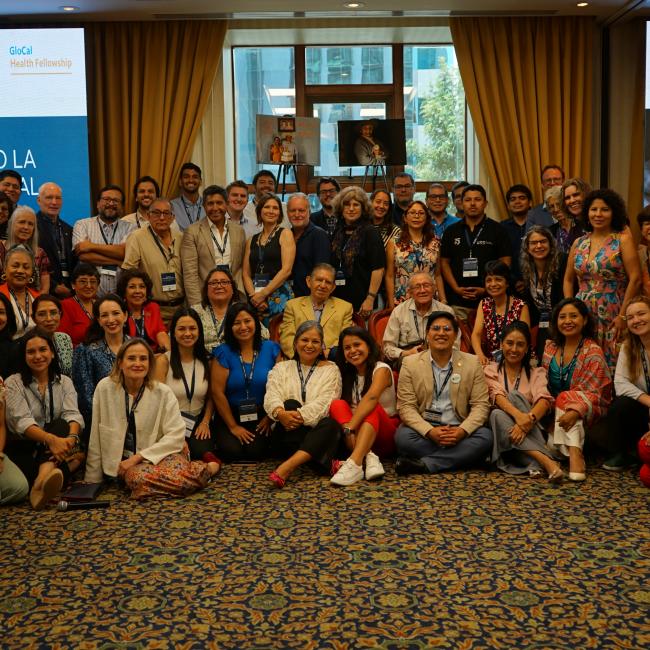If I Have Dementia, Am I Crazy?: Addressing Stigma and Misconceptions Surrounding Dementia
In this perspective, Atlantic Fellow Chukwuanugo Ogbuagu considers the complex intersection of social perceptions, medical understanding, and personal experiences to challenge misconceptions and highlight the nuanced reality of living with dementia.

Image by Freepik
The question "If I have dementia, am I crazy?" encapsulates a complex intersection of societal perceptions, medical understanding, and personal experiences surrounding dementia. Dementia, characterized by a decline in cognitive function severe enough to interfere with daily life, is often associated with misconceptions and stigma, leading to the perception of those affected as "crazy" or mentally unstable. However, a deeper exploration reveals a more nuanced understanding of dementia and its impact on individuals and society. In this perspective, I explore the complex interplay between dementia and mental health, debunking myths, and shedding light on the multifaceted nature of cognitive decline.
Understanding Dementia and Its Stigma
Firstly, it is essential to debunk the misconception that dementia equates to mental illness. Dementia is a neurological condition caused by various diseases or injuries that affect the brain's ability to function properly. It is not a psychiatric disorder or a manifestation of insanity. Instead, dementia represents a complex interplay of biological, psychological, and social factors that result in cognitive impairment.
Individuals living with dementia experience a range of symptoms, including memory loss, difficulty with communication, impaired reasoning, and changes in behavior. These symptoms can be distressing and challenging for both the individual and their caregivers. However, it is crucial to recognize that these symptoms arise from neurological changes in the brain and do not reflect the individual's character or personality.
Cultural Perspectives and Language in Dementia Care
Furthermore, the language used to describe dementia can contribute to the stigma and misconception surrounding the condition. Terms such as "madness" or "insanity" carry negative connotations and perpetuate stereotypes that further marginalize individuals with dementia. Instead, it is essential to use person-centered language that respects the dignity and humanity of those living with dementia, for instance, “person with dementia" is preferred instead of "dementia patient."
Moreover, when considering cultural perspectives on dementia and holistic health approaches, it's essential to recognize the value systems and traditions of indigenous communities. An indigenous approach to brain health often emphasizes the preservation of the family value system, community living, and interaction with nature. In many indigenous cultures, the interconnectedness of individuals within their families and communities is central to overall well-being. Traditional practices such as communal living and engagement with nature are believed to promote cognitive health and emotional resilience.
This indigenous perspective underscores the importance of considering diverse cultural beliefs and practices when addressing dementia stigma and providing support for affected individuals and their caregivers. By embracing cultural diversity and integrating traditional wisdom into healthcare strategies, we can foster more inclusive and effective approaches to dementia care.
This indigenous perspective underscores the importance of considering diverse cultural beliefs and practices when addressing dementia stigma and providing support for affected individuals and their caregivers.
—Chukwuanugo Ogbuagu, Atlantic Fellow for Equity in Brain Health
Challenges and Solutions in Resource-Limited Settings
These challenges raise important questions. How can we debunk a myth with no tool for cognitive assessment at the primary healthcare level, which, in my home in Nigeria, remains the first point of call for most elderly patients? How can we demystify this falsehood in a highly religious and cultural setting where the people believe whatever their religious and cultural leaders them without criticism? How can we improve the quality of aging seniors who experience so much stigma and are often met with violence in response to cognitive impairment? The scenario is worse in developing countries with no dementia policies to protect these elderly target populations.
To address these complex challenges, a multifaceted approach is essential. Firstly, education and awareness campaigns must be intensified to debunk myths and combat stigma surrounding dementia. By promoting understanding and empathy, we can create more supportive environments for individuals living with the condition.
Secondly, healthcare systems need to prioritize early detection and intervention for dementia, ensuring timely access to diagnosis and support services. This includes comprehensive assessments, personalized care plans, and access to mental health professionals who can address the emotional and psychological needs of individuals with dementia and their caregivers.
Additionally, community-based support networks and respite care services should be expanded to provide practical assistance and emotional support to caregivers, who often experience significant stress and burnout. By investing in caregiver support programs and respite care services, we can alleviate the burden on families and improve the overall quality of life for those affected by dementia.
Innovative Approaches and Collaborative Efforts
Furthermore, research efforts should be intensified to develop effective treatments and interventions for dementia, with a focus on preserving cognitive function and improving mental health outcomes. One promising avenue is the cross-cultural adaptation of Tablet-based Cognitive Assessment Tools (TabCAT) for the use and training of primary healthcare workers. This timely initiative is particularly relevant considering the increasing population of elderly persons in low- and middle-income countries (LMICs).
Additionally, the introduction of an early dementia diagnosis clinic in southeast Nigeria—an initiative I developed as a pilot project—is both novel and commendable. This clinic offers a platform for the scientific unraveling of perceptions around cognitive impairment and a baseline for interested research collaborators.
Intentional collaborative efforts between the global north and south researchers, healthcare providers, policymakers, and community organizations are essential to advance our understanding of dementia and develop innovative approaches to prevention, diagnosis, and treatment. Through concerted action at multiple levels, we can address the complex challenges posed by dementia and promote the mental well-being of individuals affected by the condition.
Authors

Chukwuanugo Ogbuagu, MBBS, PhD, MWACP
Public Health Physician and Lecturer

Niall Kavanagh
Communications Officer




